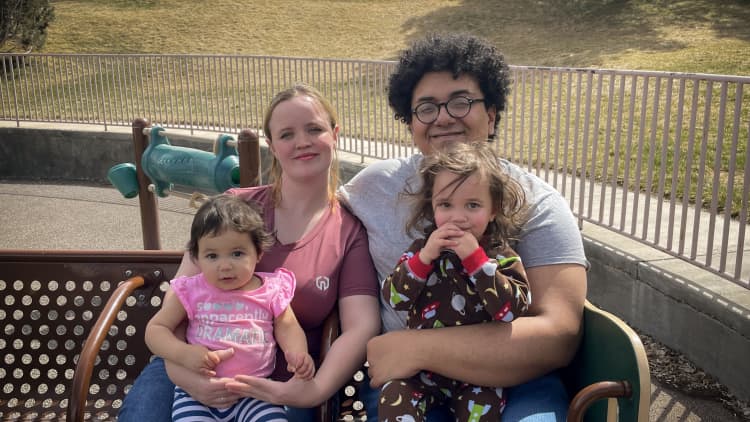This story is part of CNBC Make It's Millennial Money series, which details how people around the world earn, spend and save their money.
Norberto Orellana and Ehlana Broaddus come across as an ordinary young couple.
The pair share a "pretty modest" 2,000-square-foot home in Gillette, Wyoming, with their two young daughters, and earn a combined $78,000 per year.
But behind the scenes, the couple have overcome many obstacles to get where they are today.
Orellana, 24, grew up poor, spending time in New York, Miami and Colorado, and experienced homelessness for stretches of his youth. Broaddus, 23, meanwhile, was raised by a single mother in a low-income household and endured more than 20 surgeries to treat her X-linked hypophosphatemia, a condition that affects bone growth.
Orellana and Broaddus met in Colorado in 2018 and married in 2019. They moved to Wyoming in 2020, and now both work at a nonprofit dedicated to at-risk youth, him as a grant manager and her as a youth advocate. Orellana earns $49,000 a year, while Broaddus makes $29,000.
That they are now homeowners, have two cars and are raising a 2-year-old and 1-year old together is something that was difficult to imagine just a few years ago. "I didn't think at this point I would have been able to achieve that sort of income ... at my age," Orellana tells CNBC Make It.
And they feel like they are "just getting started" building their lives together.
"We've come pretty far, but this is what the beginning of the journey looks like," Orellana says. "I think we'll do everything we can not only to protect what we have, but continue to grow it."
How they spend their money
Here's how Orellana and Broaddus budgeted their money in April 2022.
- Housing: $1,317 for their mortgage, internet, gas, electricity, water, sewage and trash
- Child care: $1,220 for daycare and diapers
- Insurance: $1,103 for health, dental, vision and car insurance
- Transportation: $800 for gas and car payments
- Food: $550
- Discretionary: $340 for entertainment, household expenses and donations
- Phone: $90
- Cat: $60
- Subscriptions: $37 for Xbox Game Pass, Amazon Prime, Spotify and Hulu
Living in Wyoming wasn't always part of the couple's plan. They made the move in order for Orellana to pursue a Ph.D. in chemistry. However, he decided to abandon the program in favor of entering the workforce because of the income opportunities available to him.
"As I grew up, I realized that you don't have to [get a terminal degree]," Orellana says. "You can be successful in so many other ways. And so I decided to follow my true passions."
The pair decided to stay in Wyoming, both because they enjoy the state's natural beauty as well as the financial benefits. "We really like Wyoming because there's no state income tax, which is a big thing for us," Orellana says.
Broaddus adds that the couple's money goes farther in Wyoming than it might in a more expensive state. "We're living pretty comfortably," she says. "I would like to make more, but I don't feel any real sense of urgency to do so. It's a pretty good income here."
I think we're living pretty comfortably. I would like to make more, but I don't feel any real sense of urgency to do so.Ehlana Broaddus
After growing up in poverty, Orellana is careful to keep a watchful eye on the couple's finances. He uses accounting software to track both their spending and income.
"It brings me joy and I find it comforting to know exactly where everything is," he says. "I like to be able to plan out the future and know where we're headed financially."
When Broaddus goes grocery shopping, she brings a sheet created by Orellana that has their monthly food budget on it. The rough outline includes the couple's usual groceries and a maximum spending figure that they can't go over.
"Sometimes I'll find something that's a really good deal, so I'll substitute that in instead," Broaddus says. "But for the most part, I follow what he's laid out pretty closely."
The pair own two cars and have about $27,000 in auto loans. Though the $670 per month they pay toward the loans eats up a significant chunk of their income, they decided to buy the cars instead of leasing them to avoid monthly vehicle expenses in the future.
"We plan to really take care of them and keep them as long as possible," Orellana says. "Once we pay off these cars, it's going to free up so much money that we'll be able to save, invest and pay off the house with."
Their oldest child, 2-year-old Margaret, has the same bone condition as her mother. Margaret takes medication to manage her condition, but Broaddus still expects that she will eventually need corrective surgeries.
The family previously qualified for a nearly $19,000 grant from the government's Supplemental Security Income program back when Orellana was a Ph.D. student, which helps cover the expenses. They are currently in the process of applying for aid from the Assistance Fund, a nonprofit that helps families pay for their children's medical expenses.
Since they both work, Orellana and Broaddus have enrolled their daughters in a local daycare. They say the $1,100 monthly fee is "definitely a high expense," but it's worth it. "We did look at some cheaper places, but we really like the staff at the daycare we picked out," Broaddus says. "It's a really nice, safe place for the girls to go. And that's what matters."
Goals for the future
Currently, Orellana's main financial goal is to earn $50,000 in a year for the first time. He admits that it won't make a difference in his life from the $49,000 he currently earns, but reaching his goal will have a profound "psychological impact."
"[It will mean] I'm halfway toward six figures," he says. "That's a big accomplishment for me considering where I came from and the kind of incomes that my family had. Getting there would mean a lot to me in the long term."
Orellana hopes to achieve a six-figure salary while remaining in the nonprofit field, but is prepared to move into the for-profit industry in a few years if he needs to.
If he does reach that level of income, Broaddus will leave her job and focus on taking care of their children. "I'm very happy in my job. I think it's a position I could stay in," she says. "But in the long term, I would like to go back to being a stay-at-home mom. It's where I'm happiest. It's what I love to do."
Even though the couple is happy with the family they have now, they hope to one day grow it even more.
"Assuming that the financial situation is right ... we would love to have another kid, whether it's biological or adopted or fostered," Broaddus says. "We have enough love to go around."
What's your budget breakdown? Share your story with us for a chance to be featured in a future installment.
Sign up now: Get smarter about your money and career with our weekly newsletter
Don't miss: This is Kevin O'Leary's No. 1 job interview tip




